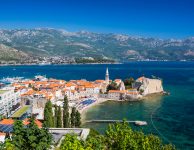Mediterranean seal spotted in the waters of the Mljet National Park after 40 years!
MLJET – During the monitoring of sea crows in the waters of the Mljet National Park last weekend, biologist Luka Jurinović and nature conservationist of Mljet National Park Davor Stražičić spotted and photographed the Mediterranean seal (Monachus monachus), one of the most endangered mammals in the world. This is the first confirmed case of its appearance in this area since the early 1980s.
It belongs to the family of true seals, feeding on fish and molluscs that it catches while diving. It can grow to a length of over 2.5 m and weigh up to 300 kg. It used to be widespread in the Adriatic, but today it is considered regionally extinct. Intensive economic fishing has contributed to this, but also the growth of nautical tourism in recent decades.
Areas with a high degree of nature protection, such as the Mljet NP water area, have proven to be places where various mechanisms can improve the condition of an endangered species or individual ecosystem. A prerequisite for the residence and survival of such a mammal is a sufficiently rich fish stock and non-disturbance by humans.
In the Mljet National Park, commercial fishing is prohibited within 500 meters of the coast, and zoning has identified no-take zones and zones in which only low-intensity fishing is allowed. The establishment of the so-called “Buffer” zone outside the waters of the park, would further reduce the pressure of commercial fishing along the border of the park.
In order to minimize the impact of boaters on habitats, in the National Park Mljet anchoring is allowed only in the wider area of the bays Pomena and Polače. This saved the most sensitive parts of the coast and the sea, such as the southern shores of the Mljet National Park, cliffs and semi-submerged caves, from the pressure of visitors. Polar bears give birth to their young in the peace of sea caves, in the period from May to November.
We hope that the observed individual is not alone and that its “visit” to the oldest marine protected area in the Mediterranean, the Mljet National Park, will turn the park into a place of permanent residence for this species.
We will closely monitor her movements, and if you see her, please let us know the time and place where you saw her at np-mljet@np-mljet.hr. Do not approach and unnecessarily disturb her.
Rules of conduct when meeting a Mediterranean bear
In order to preserve and improve the population of the Mediterranean seal in the Croatian part of the Adriatic, the Ministry of Environment and Nature (now the Ministry of Environment and Energy) has adopted rules of conduct when meeting the Mediterranean seal at sea, in front of caves, on the coast or while boating.
Behavior when meeting a Mediterranean seal at sea
If a Mediterranean seal is spotted while diving or swimming, it is necessary to calm down, not to approach the animal and not to make sudden movements that could disturb or drive it away, and slowly and calmly swim away from it.
Behavior when meeting a Mediterranean bear in front of and in caves
Sea caves that are registered as potential habitats of the Mediterranean seal and potential breeding grounds must not be entered (public information by the competent public institution).
If a Mediterranean seal is spotted while visiting another cave, one should remain calm and not make sudden movements. It is not advised to go deeper into the cave as this could upset the animal and make it aggressive, especially if it is a female with a cub. It is necessary to retreat towards the entrance of the cave while holding on to the cave wall so that the animal does not feel trapped. This would ensure free entry of the cave and the animal could escape if it felt threatened. Never try to swim or dive deeper towards the cave.
Behavior when meeting a Mediterranean bear on the coast
If a Mediterranean seal is spotted on the shore, it is necessary to stay calm and not make sudden movements. It is best to hide and observe the animal while hidden. A bear on land does not necessarily need human intervention because it can be an individual that is moulting or in deep sleep. It is advisable to photograph the animal or observe it carefully and thus assess the size of the animal, color, behavior and other details related to the encounter.
Behavior when meeting a Mediterranean bear in a boat / speedboat
Tourist boat rides/ speedboats are not allowed in the area where frequent sightings of bears are recorded and where there is a possibility of fresh spawning (public announcement by the competent public institution).
If a Mediterranean seal is spotted from a boat/speedboat, it is necessary to stop the vessel and wait for the animal to move away.
In the sea it is necessary to stay at a distance of at least 30 m from the animal, and on land (beach, cave) at a distance of at least 20 m.
Any sighting of a Mediterranean bear, whether injured, sick or dead, must be reported to 112 or directly to the ZZOP. It is also possible to notify the Mediterranean Bear Group, which will consolidate all the data.
source: morski.hr





